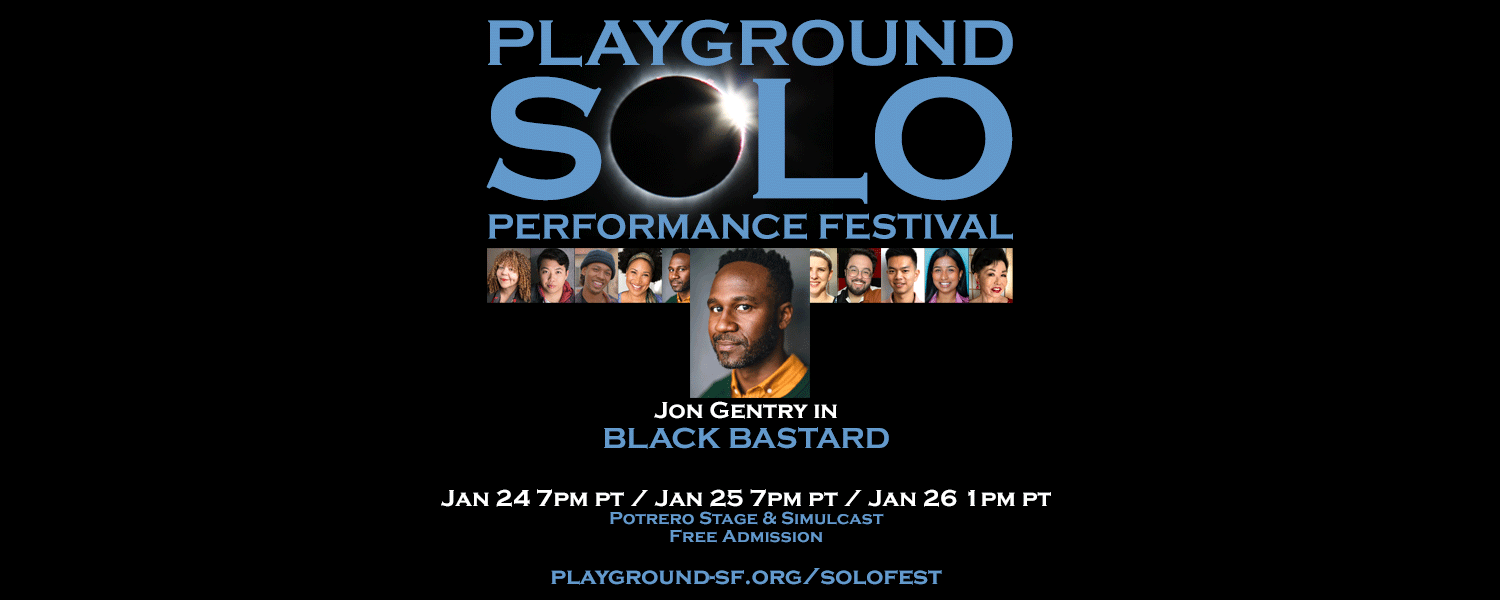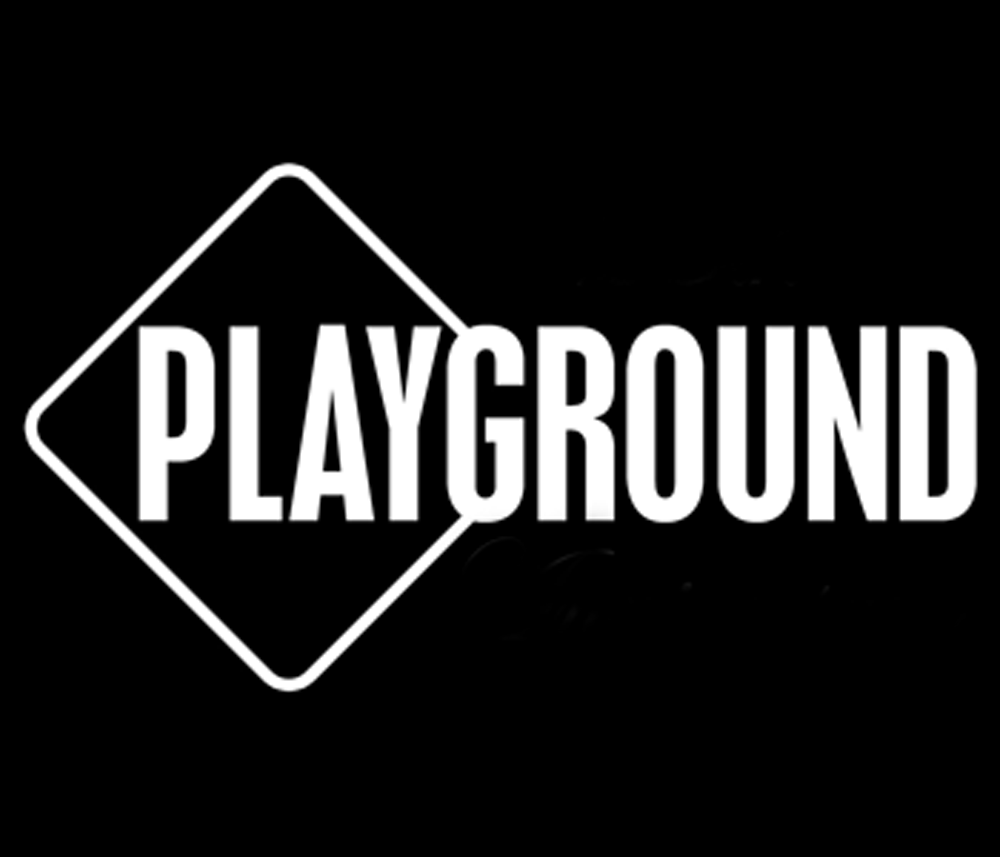Solo Fest 2025 Spotlight: Jon Gentry’s BLACK BASTARD

Join us for PlayGround’s eighth annual Solo Performance Festival, a curation of the best in California solo performance! The festival runs January 24-February 9, 2025 (Fri-Sun), presented live on our stage and also simulcast online. More…
Today we’re spotlighting Jon Gentry’s Black Bastard (1/24 at 7pm, 1/25 at 7pm, & 1/26 at 1pm). Black Bastard is a poignant exploration of identity and becoming, told in phases that move through the intricacies of growing up as the black sheep navigating queerness and fatherlessness in the South. Through literature, clowning, self-discovery, and original song, the production invokes 90s nostalgia in a jambalaya of memoir, embodied character transformation, and socio-cultural commentary. The show confronts stereotypes about absent Black fathers while exploring broader themes of identity, expression, and our collective search for belonging and ultimately home.
Hear from the playwright:
What was the seed of this play? What inspired you to write it?
Bitterness. You know how when you see a piece of fruit that you think will be sweet and juicy, but once you take a bite, it’s the opposite experience? That was the seed of this play. I had spent years helping to tell other people’s stories when I had one inside me yearning to be told. The COVID-19 pandemic coupled with the Hollywood strikes forced me to look within. I thought, “Why am I waiting for someone else to give me an opportunity?” That bitterness festering inside transformed into something sweet when I finally gave myself permission to explore my own narrative.
Why is a solo show the ideal way to tell this story?
I knew I would have to tell this story eventually, and I wanted to tell it as truthfully as possible. The theater is where I feel most at home, so I figured I’d start there. I had no clue what I was doing, but I was stubborn and determined. What I learned along the way is that there are no rules; you get to build your own sandbox. That was the most liberating part about creating the show — I get to do whatever I want! Don’t get me wrong, I was terrified. “Am I really about to share all of this with people?” The pain? The joy? The confusion? Fortunately, I quickly learned that “solo show” is a bit of a misnomer because community is imperative in any act of creation. Working with Shinelle (the director) and many other creative partners was instrumental in bringing the show to life. There’s no way I could have done this without them. And now that I’ve done the show a few times, I know that I am not alone onstage when there’s an audience listening and responding in ways that shape the telling of the story anew each and every performance.
What are your artistic influences for this show?
Colman Domingo, John Leguizamo, and David Dean Bottrell showed me how to transform personal narrative into universal truth through solo performance. The fearless scope and scale of Paul Outlaw, the cultural excavation work of Dan Kwong, and the raw honesty of Steven Strafford all influenced my approach to storytelling. Their work taught me that solo performance can be both a mirror and a window. Charlayne Woodard’s influence runs particularly deep—she taught me the value of sharing my stories in everyday settings before bringing them to the stage. This practice of informal storytelling helped me discover which moments truly resonated, allowing me to refine my narrative with the immediate feedback of genuine human connection.
What surprised you during the creation of this piece?
The creative impulse kept me off-kilter during the creation of this piece. Usually, I live in my head and weigh over every potential decision, but I said “Yes” this time to each impulse that came my way. Instead of being led by “Why?”, I allowed myself to be guided by “Why not?” This mentality led to some of the more surprising elements in the show. One day I was stuck on one of the later chapters and wanted to breathe more life into it, so I thought “What if I incorporate a dose of magical realism?” Then came that nagging voice about to say “You can’t do that…” before I realized “Who gon’ stop me?!” I caught a second wind and ran with that idea, which has become one of my favorite parts to perform.
Is there anything audiences should know about you or your piece before they attend? And/or is there anything else you want to share about your piece?
This piece is a ceremony of becoming — who we want to be, who we are, and who we’ve always been. Ideally, we recognize these evolving identities as distinct parts of our whole self. While the story is deeply personal, it touches on universal themes of searching for home and finding one’s voice. Prepare to laugh, to feel, and perhaps to recognize pieces of your own journey in mine—and don’t be surprised if you find yourself becoming part of the story too. I invite you to dive into the play and don’t hold back. All are welcome.
Jon Gentry (BLACK BASTARD) was born and raised in Houston, Texas. He earned his BA in English from Harvard, where he served as President of BlackCAST. He holds an MFA in Acting from the American Conservatory Theater. As a teaching artist, he co-directed “Child Life” with UCSF Children’s Hospital and led acting workshops across the Bay Area. He currently teaches Michael Chekhov Acting Technique at the Los Angeles Performing Arts Conservatory. Regional theater credits include roles in Masao and The Bronze Nightingale, A Christmas Carol, and Romeo and Juliet. Onscreen, he appeared in TEN, Behold a Lady, Meeting Matt Damon and voiced Preston Garvey in Fallout 4, gaining viral fame.
